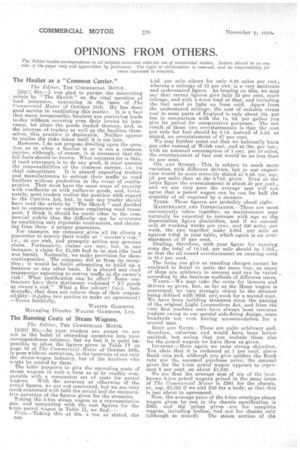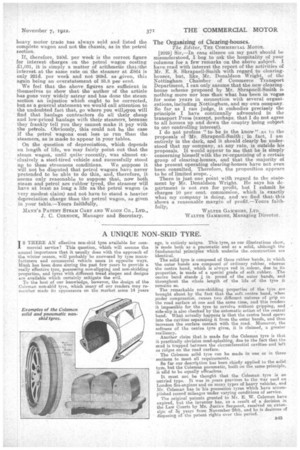OPINIONS FROM OTHERS.
Page 28

Page 29

If you've noticed an error in this article please click here to report it so we can fix it.
The Editor invites correspondence on all subjects connected with the use of commercial motors. Letters should be on one side of the paper only and typewritten by preference, The right of abbreviation is reserved, and no responsibility for views expressed is accepted.
The Haulier as a "Common Carrier."
The Editor, THE COMMERCIAL MOTOR.
[2027j Sir,—I was glad to peruse the interesting article by " The Skoteh " on the vital question of load insurance, appearing in the fissue of The Commercial Motor of October 24th. He has done good service in ventilating this matter, h is a fact that many irresponsible hauliers are conveying loads to-day without coveying even their lorries by insurance, let alone the goods loaded thereon, and, in the interest of traders as well as the hauliers themselves, this practice is deplorable. Neither appear to realize the risks taken until it is too late.
However, I do not propose dwelling upon the question as to when a haulier is or is not a common carrier, although, of course, it is necessary that the full facts should be known. What concerns me is that, if road transport is to do any good, it must assume the responsibilities of the common carrier, i.e. its
chief competitors. It is absurd. expecting traders and manufacturers to entrust their traffic to road hauliers without protection in the event of contingencies. They must have the same sense of, security with roadborne as with railborne goods, and, fortunately, most traders realize the position with regard to the Carriers Act, but, in case any trader should have read the article by The Skotch " and decided not to commence or continue employing road transport. I think it should be made clear to the commercial public that the difficulty can be overcome by employing Only reputable contractors, and obtaining from them a proper guarantee.
For example, my company gives all its' clients a guarantee to convey their traffic at " carrier's risk," i.e., at our risk, and promptly settles any genuine claim. Fortunately, claims are rare, but, in one instance, a claim for 21,200 had to be met (the load was burnt). Naturally, we make provision for these contingencies. The company did so from its inception ; it would be futile attempting to build up a business on any other basis. It is absurd any road transporter expecting to convey traffic at -the owner's risk! What justification can he offer? Some contractors have their stationery endorsed " All goods at owner's risk." What a fine advert ! (sic). Inridentalily, that does not relieve them of their responsibility--it.taltes two parties to make an agreement! --Yours faithfully,
WALTER GAMMONS.
Managing Director WALTER GAMMONS, LTD.
The Running Costs of Steam Wagons.
The Editor, THE COMMERCIAL MOTOR.
[2028] Sir,—As your readers are aware we are not in the habit of obtruding ourselves into your correspondence columns, but we feel it is quite impossible to allow the figures given in Table IV on page 82 of The Commercial Motor of October 25th, to pass without correction, in the interests of not only the steam-wagon industry, but of the hauliers who might be misled by them.
The table purports to give the operating costs of steam wagons in such a form as to be readily comparable with a companion set of costs for petrol wagons. With the accuracy or otherwise of the petrol figures, We are not concerned, but we are very much concerned with both the actual and the comparative accuracy of the figures given for the steamers. Taking the 5-ton steam wagon as a representative size, and comparing with the cost figures for the 5-ton petrol wagon in Table II, we find :— FUEL.—Taking this at '50s, a ton as stated, the 1344 3.5d. per mile allows for only 8.58 miles per cwt., whereas a mileage of 12 per cwt. is a very moderato and understated figure. As bearing on this, we may say that recent figures give fully 25 per cent. more mileage, and with a 6-ton load at that, and including the fuel used to light up from cold. Apart from the understated mileage, the Cost of suitable steam coal in 'nest parts of England is only about 42s. per ton in comparison with the Is. 8d. per gallon you give for petrol for comparative purposes. The net result of. these two overstatements is that the cost per mile for fuel should be 2.1d. instead of 3.5d. as stated, an overstatement of 67 per cent. • •
We may further point out that we habitually burn gas coke instead of Welsh coal, and at 30s. per ton ; with an assumed consumption of 1 cwt. per 10 miles, the overstatement of fuel cost -would be no less than 94 per cent. OIL AND STORES.--This is subject to much more variation with different drivers, but in our experience would be more correctly stated at 0.4d. (or, say, J. per mik) than at the 0.74d. given. Even at the latter figure the overstatement is about 50 per cent., and we are very sure the average user will not agree that a petrol wagon can be run for half the quantity of oil required by a steamer.
TYRES.—These figures are probably about right.
MAINTENANCE AND DEPRECIATION.—These are most conveniently taken together, as maintenance may naturally be expected to increase with age as tho depreciation figure diminishes, and if we assume' only 48 working weeks per year, and 300 miles per week, the two together make 2.88d. per mile as against 3.95d. in your table, which again is an overstatement of 37 per cent. Dealing, therefore, with your figure for running costs the total of 10.14d. per mile should be 7.33d., so that the all-round overstatement on running costs is 38.4 per cent.
The items you give as standing charges cannot be analysed in detail in quite the same way, as many of them are arbitrary in amount and can he varied according to the business methods of different users. Waciv.s.—We may take the costs for licences and drivers as given, but, so far as the Mann wagon is concerned, we very strongly object to the steamer being debited with 360d. per, week for a second man. We have been building steamers since the passing of the original Light Locomotives Act, and from the very first machine ours have always been one-man wagons owing to our special side-firing design, some hundreds not even having accommodation for a second man.
RENT AND RATES. —These are quite arbitrary and. therefore, valueless and would have been better omitted, but seeing that you include them also for the petrol wagons we leave them as given.
INTEREST.—Here again we raise strong objection. You state that it is reckoned at 1 per cent. above Bank rate and, although you give neither the Bank rate nor the assumed purchase price, the amount given for the 5-ton petrol wagon appears to represent 5 per cent, on about £1,040.
We see that the average cost of six of the bestknown 5-ton petrol wagons priced in the same issue of The Commercial Motor is £981 for the chassis, or, saF, 21,031 if we add £50 for a body, so that this
is just about in agreement.
Now, the average price of the 5-ton overtype steam wagon given by you in the chassis specification is 2864, and the prices given are for complete
wagons, including bodies', not for chassis only (although so stated). The steam section of the heavy motor trade has always sold and listed the complete wagon and not the chassis, as in the petrol section.
If, therefore, 240d. per week is the correct figure " for interest charges on the petrol wagon costing 21,031, it is simply a matter of arithmetic that:the interest at the same rate on the steamer at £864 is only 201d. per week and not 269d. as given, this again being an overstatement of 33.8 per cent. We feel that the above figures are sufficient in themselves to show that the author of the article has gone very widely astray and has done the steam section an injustice which ought to be corrected, but as a general statement we would call attention to the undoubted fact that, go where you willoyou will find that haulage contractors do all their cheap and low-priced haulage with their steamers, because they frankly tell you they cannot make it pay with the pebrols. Obviously, this could not be the case if the petrol wagons cost less to run than the steamers, as is made to appear in your tables.
On the question of depreciation, which depends on length of life, we may fairly point out that the steam wagon, until quite-recently, was almost exclusively a, steel-tired vehicle and successfully stood up to these strenuous conditions. We suppose it will not be disputed that petrol wagons have never pretended to be able to do this, and, therefore it seems only reasonable to suppose that, new both steam and petrol are rubber tyred, the steamer will have at least as long a, life as. the petrol wagon (a very modest claim) and not have to stand a heavier depreciation charge than the petrol wagon, as given in your table.—Yours faithfully,
MANN'S PATENT STEAM CART AND WAGON CO., LTD., J. C. CORNOOK, Manager and Secretary. The Organizing of Clearing-houses.
The Editor, THE COMMERCIAL MOTOR.
[2029] Sir,—In ease silence on my part should be misunderstood, I beg to ask the hospitality of your columns for a few remarks on the above subject. I have read with interest the report of the activities of Mr. E. S. Shrapnell-Sinith with regard to clearinghouses, but, like Mr. Donaldson Wright, • of the Nottingham Chamber of Commerce Transport Department, I can only assume that the new clearinghouse scheme proposed by Mr. Shrapnell-Smith is nothing more nor less than what has been in vogue for some years in connection with several organizations, including Nottingham, and my own company. So far as I can judge, it embodies precisely the principle I have continually advocated in the transport Press (except, perhaps, that I do not agree to all houses up and down the country being subject to one controlling interest). I do not profess "to be in the know" as to the proposals M Mr. Shrapnell-Smith; in fact, I am entirely in the dark, and it should clearly be understood that my company, at any rate is outside his proposals. It would appear to me that he is simply concerning himself with the re-organizing of a certain group of clearing-houses, and that the majority of the present operating clearing-houses have not even been consulted. Therefore, the proposition appears to be of limited scope.. There is just one point with regard to the statement by Mr. Donaldson Wright. lie says his department is not run for profit, but I submit he charges 10 per cent. commission, which is exactly what my company is doing, and we find that■ this shows a reasonable margin of profit.—Yours faithfully,
WALTER GAMMONS, LTD. WALTER GAMMONS, Managing Director,
































